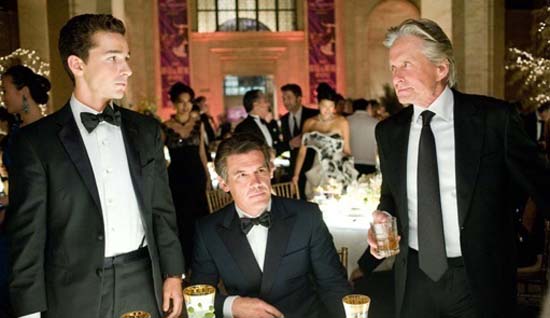My favourite version of the Faust myth is Christopher Marlowe’s Doctor Faustus. Marlowe’s work contains examples of nearly every cliché now associated with men tempted into a hubristic fall: Faustus starts with a good and evil angel perched on each of his shoulders; he explores the mysterious potentialities of a type of dangerous knowledge he does not fully understand; he signs his soul to the devil, in his own blood; and – the most seductive aspect of all – he is tempted into his fall by an unavoidably alluring figure, here Mephistopheles, Lucifer’s right hand man. Mephistopheles represents that nagging self-doubt, that familiar breach of abstinence latent in all of us. Upon presenting Faustus with a book of necromancy, he inveigles him into reading it with beguiling promises: “Here, take this book and peruse it well./ The iterating of these lines brings gold.” This of course has clear parallels with Oliver Stone’s Wall Street and, indeed, its sequel Wall Street: Money Never Sleeps – especially the promises of gold.
If the first film works at all (and on re-watching it is not clear if it still does) it is by the power of Stone’s own answer to Mephistopheles; the darkly seductive, devilishly brilliant Gordon Gekko. In the original Wall Street, Stone is able to distill all of capitalism’s most nefarious aspects into his central antagonist, creating a morality tale with a clear sense of human right and wrong. We do not have to fully understand the intricate mechanics of the chaotic cacophony that was the eighties stock market, just that there were those operating in the right way – usually hopping around, looking like they were frantically signaling semaphore under the influence of meth-amphetamines, and those operating the wrong way – corporate raiders conducting their deals calmly in lushly furnished offices, having received their information long before the economic insects buzzing around the exchange. The Mephistophelian Gekko is the embodiment of the latter, and it is not difficult to see why Charlie Sheen’s Bud Fox is so seduced by his forked tongue mantra: as the now famous speech goes, “Greed – for lack of a better word – is good … Greed clarifies, cuts through, and captures the essence of the evolutionary spirit.”
Thus the first film becomes an obvious parable of a son and two fathers – a recurring trope in Stone’s work. Bud must choose between the homespun rhetoric of his blue-collar father, or the slick, magnetic performance of Gekko. The second film has no such solid triumvirate to use as its foundation. It tackles the run up to and implosion of the financial markets in 2008. This backdrop makes it very difficult to discern one true villain of the piece. Most of the financial sector was implicated in the crash, and pinning down an individual culprit, even in the medium of fiction film, is nigh on impossible. Needless to say, it is difficult to imagine what the embodiment of a subprime mortgage or ‘toxic debt’ would look like (perhaps Sir Fred Goodwin bathing in his £16 million pension, or something similar), but it is certainly not to be found here.
We instead follow Jake Moore (Shia LaBeouf), an idealistic young proprietary trader, coincidentally dating Gekko’s daughter, who is attempting to find the right path between the advice of his good angel, played here by Louis Zabel (Frank Langella), and his evil angel, manifested by the shark-like investment banker Bretton James (Josh Brolin). Only when one thinks about it, neither of these men really represents an appropriate role model. The character of Zabel is meant to serve as a moral touchstone for Jake. But his firm, Keller Zabel, is the first to fold; his morally correct, old school approach has been unable to keep up with a marketplace full of new techniques and complex derivatives and as a result has suffered the harsh consequences. This lack of understanding should not, however, absolve him of blame. Yet in the world of the film it does, and Jake venerates him throughout. This kind of maudlin sentimentality is present in much of the film, but such nostalgic ideas about the banking system offer no answers to the mess we now all find ourselves in.

The mysterious potentialities of the subprime mortgage trading system were not understood by many of the economists and bankers themselves. Should they, then, have been so involved in such complicated processes? Stone fails to pose this question, and instead highlights the greed of those who fully comprehended the financial trading situation of the noughties, implying they were running an exploitative racket, extorting money out of those less knowledgeable. This approach is idealistic and a little naïve. Both parties were culpable for the mess; those using their dangerous knowledge to exploit the system through active opposition to regulation and uncontrolled greed, as well as those who did not have a full grasp of the financial markets. They cannot simply claim ignorance as a defense; instead they are possibly liable on the grounds of incompetence. They should not, as Stone’s film does, be held up as sorry old timers, victims of an economy with which they could no longer keep pace. The resultant damage has simply been too great for such a view to hold water.
This confusion spills out into the film itself. It has a visual style as intricate and disorientating as the various financial TLAs (Three Letter Acronyms to you and me) it seeks to represent on screen. For every ARM there is an unnecessary split screen; next to every MBS a series of graphs fly up and down, or stock numbers rush in from all angles; and at the precise moment of meltdown an unfathomably large set of dominoes are set in motion (it is perhaps a relief that in this film they are confined to two dimensions!). Stone’s standout qualities as a filmmaker are his convincing overreaching arguments and interesting visual style, yet here both seemed to have failed him, and the resulting movie is something of a mess.
And so back to the film’s one potentially redeeming feature: the return of the Mephistophelian Gordon Gekko. The story is taken up on his release from prison having served 13 years for insider trading, and the question remains; will the leopard have changed its spots, or, perhaps more appropriately, will the lizard have changed its skin tone? Gekko certainly seems to have mellowed in his old age. He no longer appears to take a bulk order of Dax Wax every month (although we are entitled to at least a few shots of his trade mark slicked back look as part of the film’s ‘knowing’ system of references to its predecessor). He is now a kind of financial guru promoting his critique of the modern economy Is Greed Good?: think a hammed up Steven Levitt without the wit but with more of the charisma. There are flashes of the old malevolence in the rehabilitated Gekko; he coerces Jake into signing away, if not his soul, a huge amount of his girlfriend’s money, and there is an effusive montage of Gekko using the proceeds to buy sharp sharkskin suits and reacquire his shares in Imperial Dax. But this is perhaps not enough for those who were seduced by the unashamed egoistic malice of Stone’s original creation. He has gone from damaging racketeer to damaged old man.
Marlowe’s play leaves Faustus’s final confrontation with Mephistopheles offstage; there is little doubt as to Faustus’s fate, but we do not actually see it. This is also the case with the final courtroom scene in the first Wall Street: it ends with Bud Fox ascending the steps, but the trial itself is left to our imagination. There is still a chance Gekko’s silver tongue will get him out of trouble. Stone, although not the subtlest of filmmakers, has left a teasing equivocation of an ending, one befitting of his antihero. The sequel affords its audience no such subtlety, no such ambiguity; nothing is left to the audience’s collective understanding or imagination. It has attempted to construct a mainstream Hollywood narrative out of the intricate mess of the financial crisis. Perhaps because we are all bored of hearing about financial Armageddon, or perhaps because the financial crisis is inherently unmanageable Hollywood material, Wall Street: Money Never Sleeps leaves you wishing that money would at least have the decency for a mid-afternoon nap, if not its full eight hours.



